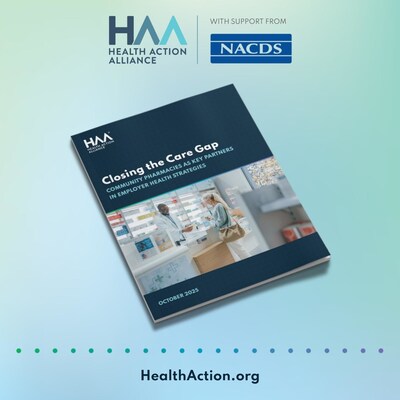New Report: Pharmacies Can Close Healthcare Gaps for Millions While Realizing Substantial Savings for Employers
National study shows pharmacy-based care reduces costs while meeting employee demands for convenient healthcare access
ARLINGTON, Va., Oct. 16, 2025 /PRNewswire/ -- American employers facing rising healthcare costs and worker demands for improved access to care should expand pharmacy services to find relief. A new report from the Health Action Alliance, commissioned by the National Association of Chain Drug Stores (NACDS), reveals that pharmacy-based care offers practical solutions to workforce health challenges while significantly reducing healthcare spending.
Notably, the report — Closing the Care Gap: Community Pharmacies as Key Partners in Employer Health Strategies — which is based on national surveys, employer interviews, and expert roundtables, found a striking awareness gap. While 89% of U.S. workers view pharmacy-based care positively and 71% say it would improve their health, survey findings revealed an overwhelming lack of awareness about the range of services pharmacies can offer. Similarly, many employers remain unfamiliar with proven returns on investment these services deliver — a missed opportunity to curb costs and close access gaps for employees.
"Employers need to control healthcare spending and increase access to care without shifting more costs to workers," said NACDS President and CEO Steven C. Anderson. "This report demonstrates that pharmacy-based care meets personal and business needs — this is high-quality, accessible, affordable healthcare that keeps employees healthy and at work. Pharmacy partnerships help reduce both direct healthcare costs and the indirect costs of employee absences — while improving quality of life."
The employee perspective is clear and compelling. Sixty-five percent say pharmacy services would help them avoid missing work. Trust is high, too — roughly eight in ten (77%–88%) are comfortable with pharmacists providing treatment and preventive care, and 81% trust pharmacists to diagnose and treat routine illnesses. For many, it's simply easier: 62% find a pharmacy visit more convenient than seeing a primary care doctor. Meanwhile, employees are feeling the effects of a strained healthcare system: half of employees say wait times are too long, about one-in-three skip appointments because they're inconvenient, and more than a third struggle with high copays. Pharmacies, with convenient hours and accessible locations, offer a sensible and trusted solution to bridge these gaps and keep employees healthy on the job.
Employers are beginning to take note. Seventy-three percent of employers believe pharmacy-based services would help reduce employees' out-of-pocket spending. Convenience is a major draw — 92% consider pharmacy locations convenient, and 89% cite easy access and extended hours as key benefits. Cost savings lead the list of reasons to support pharmacy services (92%), followed by employee demand (77%). Markedly, 58% say they're open to expanding pharmacy options in their benefits packages — and none expressed opposition.
"Employers understand they need new strategies to control costs while keeping workers healthy and productive," said Health Action Alliance Co-Founder and Co-CEO Stephen Massey. "When pharmacy services show consistent positive returns on investment and employees overwhelmingly support these options, the business case writes itself."
The evidence backs that momentum. Research cited in the report indicates that pharmacy-led chronic disease management programs can significantly reduce hospital admissions and emergency visits. With 96.5% of Americans living within 10 miles of a pharmacy and 78 million lacking adequate access to primary care, pharmacies offer an existing infrastructure to address healthcare gaps. Studies show that pharmacy-based hypertension care alone could save the healthcare system trillions of dollars over three decades while adding millions of life years.
To help translate this evidence into results, the report outlines actionable considerations for employers, including adding clinical pharmacy services to health benefit plans, educating employees about available services, opportunities to partner directly with local pharmacies, and tracking results using established metrics. Policy changes that ensure fair reimbursement and let pharmacists practice at the top of their education and training will multiply these benefits for both employers and workers nationwide.
"Beyond the steps that employers can take today, working with policymakers to expand pharmacist scope of practice and create sustainable payment models will ensure every American has access to the care they need, when and where they need it," Anderson said. "This report provides the roadmap — now we need action from employers, health plans, and government leaders to realize the full potential of pharmacy-based care."
Access the report here.
NACDS represents traditional drug stores, supermarkets and mass merchants with pharmacies. Chains operate over 40,000 pharmacies, and NACDS' member companies include regional chains, with a minimum of four stores, and national companies. Chains employ nearly 3 million individuals, including 155,000 pharmacists. They fill over 3 billion prescriptions yearly, and help patients use medicines correctly and safely, while offering innovative services that improve patient health and healthcare affordability. NACDS members also include more than 900 supplier partners and over 70 international members representing 21 countries. Please visit NACDS.org.
![]() View original content to download multimedia:https://www.prnewswire.com/news-releases/new-report-pharmacies-can-close-healthcare-gaps-for-millions-while-realizing-substantial-savings-for-employers-302586520.html
View original content to download multimedia:https://www.prnewswire.com/news-releases/new-report-pharmacies-can-close-healthcare-gaps-for-millions-while-realizing-substantial-savings-for-employers-302586520.html
SOURCE National Association of Chain Drug Stores


